You’ve heard the advice about how to survive a heatwave: drink more water, avoid strenuous activity, use fans or air conditioning… While these tips are helpful for short-term heat waves, they are less useful during massive heat waves.
What if the power goes out during a heatwave, and you can’t run your AC? What if you have medical conditions? What if the heatwave causes a wildfire?
Below are 14 heat safety tips and steps to prepare for a massive heatwave.
Massive Heat Waves on the Way?
Every summer, the news is full of reports of massive heat waves in various parts of the world. It isn’t just that news coverage is increasing.
The number of heat waves has risen drastically since the 1990s. They also last longer, with record-high temperatures lasting months instead of days.
Worst Heat Waves in Recent History
- Europe 2003: The two-month heatwave caused 70,000+ deaths and billions in agricultural damage
- America 2006: Starting in mid-July, the heatwave hit areas across the USA and parts of Canada. The heatwave persisted in some areas until the end of August. Temperatures got to 115F in South Dakota and 130°F in parts of California. At least 225 people died.
- Russia 2010: This 44-day heatwave killed 56,000 people and sparked wildfires.
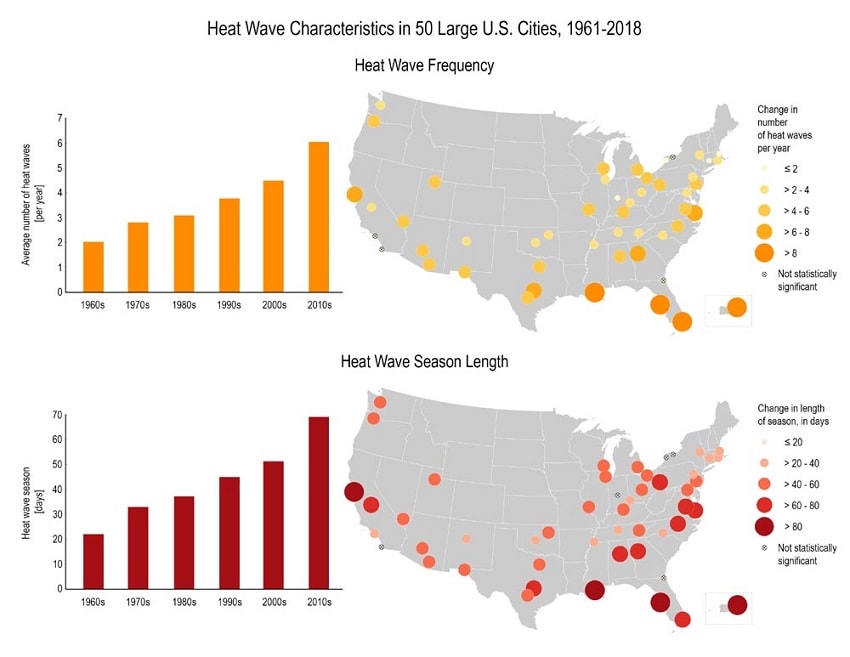
These heat waves aren’t rare flukes. Climatologists predict prolonged heatwaves will be common in the USA by 2039. And, if greenhouse gas emissions continue at their current levels, by 2100, three out of four people on Earth will be subject to deadly heat and humidity levels for at least 20 days of the year. (2, 3)
This isn’t a debate about global warming. The risk is a reality that would be irresponsible to ignore.
Heat Waves are Deadly
Extreme heat is the second leading cause of weather-related deaths in the USA (behind hurricanes).
Over 600 people die annually in the USA alone due to extreme heat. It doesn’t even take much of a temperature spike to increase deaths: studies found each 1°C (1.8°F) rise in temperature increased death rates by up to 5%.
During the July 2018 heatwave in Quebec, the record-high temperature of 98F caused 70 deaths. The morgue became so crowded they had to send bodies to a funeral home for storage. (5, 6)
Disasters Associated with Heat Waves
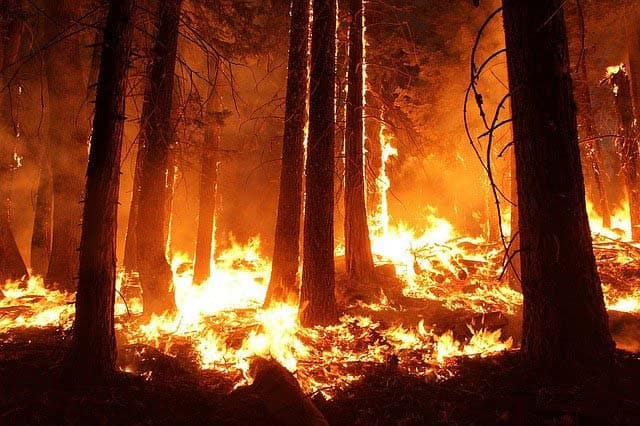
In addition to directly causing death, heat waves can lead to other disasters (7):
- Power outages
- Drought
- Famine
- Infrastructure damage
- Air pollution
- Increased crime
- Riots
How to Prepare for a Massive Heat Wave
These 14 steps will prepare you for heatwaves, including the disasters like wildfires and power outages that may accompany them.
1. Identify if You Are At Risk
Extreme temperatures can cause dehydration, heat stroke, and other heat-related illnesses. Heat can also worsen medical conditions, increasing the likelihood of death. If you or a family member is vulnerable, you must take extra precautions against heat waves.
Vulnerable groups include:
- Elderly: The elderly are most likely to die during a heatwave. They have diminished ability to sweat, weaker cardiovascular systems, and less ability to detect thirst.
- Infants and young children are also less able to regulate body temperature and rely upon others to keep them cool and hydrated.
- Pregnant and nursing women: These women can easily become dehydrated during heat waves.
- People who work outdoors
- People with pre-existing medical conditions, including cardiovascular diseases, respiratory illnesses like asthma, and kidney disease.
2. Medication Safety during Heat Waves
Taking medications during a heatwave might be risky. The heat can affect how the medicines act in the body. Or the drugs themselves may make heat-related illnesses more likely.
Some medications may:
- Reduce sweating. This includes anticholinergic drugs in many antihistamines, antidepressants, and anti-Parkinson disease medications.
- Increase heat production in the body. This includes OTC nasal decongestants and stimulants.
- Dilate blood vessels: When the blood vessels are dilated, more heat goes to the skin, increasing the risk of heatstroke. Many blood pressure medicines are vasodilators.
- Become toxic in high heat. The heat can change the chemistry of the actual medicine. Dehydration causes blood volume to change, and the drug becomes dangerously concentrated in the body.
- Lose their efficacy. Drugs like antibiotics, painkillers, and adrenaline are susceptible to heat. They might not work if exposed to high temperatures.
Talk to your doctor about your medications and whether dosage/usage should change during a heatwave.
3. Learn Heatstroke First Aid
The main goal is to cool the body down to safe temperatures.
To be prepared, consider getting instant cold packs activated by squeezing. Unlike freezer cold packs, these will be available even if the power is out.

4. Stockpile Water
Staying hydrated by drinking ample water is incredibly important. But what if there isn’t any water to drink?
Water outages sometimes occur during heat waves because of damaged pipes: the roads get so hot they collapse and damage the pipes underneath. You’ll need a stockpile of water to get you through the heatwave.
Read this post on how much water to stockpile.
5. Stockpile No-Cook Foods
The main reason to stockpile food during a heatwave is so you do not have to leave your home to go shopping. These foods should ideally require no cooking; using your stove will make it even hotter inside your home.
Another reason to stockpile food is that the droughts accompanying long-term heatwaves wipe out crops. A long-term heatwave could lead to food shortages and famine.
It’s good practice to have at least a 30-day supply of emergency food on hand anyway. See a list of the best foods for your 30-day supply.
6. Keep Your Home Cool
When the temperatures start getting over 100F, staying cool isn’t just about comfort. Keeping your home cool is imperative to prevent heat exhaustion and heatstroke.
Here are things you can do so your home stays cool during a heatwave.
- Have your AC checked regularly. You’ll want a professional to check for holes in the air conditioning ducts. Window units should be adequately insulated. Units should be cleaned and maintained before AC season begins so you don’t experience problems when you need your AC the most.
- Insulate your home. This will help keep cool air inside your home and hot air out.
- Install window reflectors. These go over your windows on the interior side. They reflect heat away from your home. You can make your own by getting cardboard and putting aluminum foil over it.
- Get thermal drapes. Thermal drapes are a small investment towards keeping heat out of your home. The good ones are made of two or three layers of fabric and can reduce the amount of light entering the home by 90%. You can also use shutters and awnings to keep out hot air.
- Use weather strips on doors and windows. This will help trap cool air in the home.
- Turn off lights and electrical devices. These produce a surprising amount of heat. Turning them off will also reduce the electric load.
7. Avoid Leaving Your Home
In addition to food and water, stockpile other necessary supplies so you don’t have to leave your home until the heatwave is over. It might sound dramatic, especially if you plan on traveling in an air-conditioned car, but consider this:
- Roads MELTED during Australia’s 2016 and 2019 heatwaves, forcing drivers to abandon their vehicles.
- During the 2006 heatwave in the USA, Interstate 44 in Oklahoma City had to close when it buckled from the heat.
- In India, during heat waves, people lost shoes when they got stuck on melted asphalt while trying to cross the road. (10)
You risk having your vehicle get stuck or damaged if you go out into the heatwave. On top of that, pollution levels can get dangerously high during heat waves. It’s better to play it safe and stay at home.
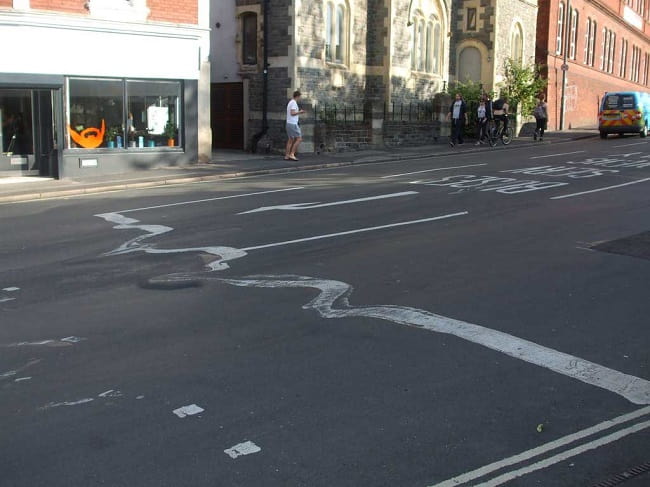
8. When Going Outdoors
If you must go outdoors during a heatwave, make sure to:
- Wear appropriate clothing. Clothes should be light-colored, loose, and made from non-synthetic, breathable materials.
- Avoid going out alone. You want someone nearby to help you if you suffer from heatstroke.
- Never leave children or pets alone in a vehicle. Not even for “just a minute”!
- Be aware of the symptoms of heat exhaustion. Get to a cool place if you have any of these symptoms.
- Drink water every 15 minutes, even if you don’t feel thirsty.
- Have a vehicle emergency kit. If your vehicle breaks down or gets stuck in melted asphalt, you’ll need supplies to stay safe. See a checklist here.
- Consider a face mask. When heat and oxygen mix with pollutants like car exhaust, the amount of dangerous ozone created gets worse. You can even see the pollution on these hot days as haze. Wearing an N95 face mask will filter out 95% of airborne particles.
9. Be Ready for Power Outages
When the temperatures get high, more people turn on their air conditioning. The increased spike in electric usage can blow the grid. This is what happened during the 2009 heatwave in Melbourne, Australia.
The high heat can also directly affect the power lines, making them less efficient in carrying power. This can lead to outages as well. (13, 14,)
Without the power to run AC or fans, people cannot keep cool and succumb to heatstroke. To stay safe, have a plan for staying cool if the power goes out during a heatwave.
- Get a generator. Portable generators can be used to run wall AC units or electric fans. Make sure you know how to use the generator safely and have extension cords rated for it.
- Consider solar panels. If a generator isn’t feasible, you can get a portable solar charger with a solar power bank to store electricity. The battery can then be used to power small electric fans. Note that most grid-tied solar systems won’t work when the power goes out unless you adapt the system so it can.
- Create a “cool room.” This room should face north or east, have good ventilation, have thermal drapes over the windows, and be well-insulated. You can use a generator or solar-powered fan to cool just this room.
- Open windows at night for ventilation. When the temperatures cool at night, open the windows to allow cool air to enter. Make sure it is safe to do so by putting security bars over your first-floor windows.
10. Stay Hydrated
Drink plenty of water even if you don’t feel thirsty. You’ll also want to avoid caffeine and alcohol, which can dehydrate you faster.
However, drinking too much water can be dangerous. It can over-dilute the salt in your body, resulting in “water intoxication.” To make sure you stay hydrated, drink electrolyte solutions like Gatorade. I always have electrolyte packets (rehydration salts) in my first aid kit.
*If you have kidney disease, liver disease, epilepsy, or another condition requiring restricting fluids, consult your doctor about how to best stay hydrated.
11. Check On Family and Friends
If any of your neighbors or loved ones are vulnerable to heat (elderly, have medical conditions, live alone, or don’t have AC), you should plan to check in on them.
Likewise, if you are vulnerable, you should ensure someone is checking in on you. Plan this before a heatwave hits so you aren’t left without help when needed.
12. Keep Pets Safe
A lot of people don’t realize how vulnerable pets are to heatwaves. Here are ways you can keep them safe:
- Provide more water. During a heatwave, your pets should have at least two water sources. Remember, they will drink more water than usual, so plan accordingly. You don’t want your pet to run out of water while you are out of the house.
- Don’t walk pets on hot surfaces. The sidewalks and roads can get hot enough to fry an egg during a heatwave. This can scald your pet’s sensitive paws. If you must walk your pet outdoors, put protective booties on it.
- Put ice packs on cages. Small animals in cages, like hamsters and birds, can be kept cool with an ice pack wrapped in a towel. Ensure it is positioned so they cannot chew it—some animals also like frozen water bottles in their cages.
- Don’t shave your pet. Many cats and dogs have double coats. They shed the undercoat when it is hot. The topcoat helps them stay cool and prevents sunburn. Unless your vet says otherwise, shaving them is more harmful than helpful.
- Beware of heatstroke symptoms. If your pet starts acting anxious or panting or drooling a lot, you should take him to the vet immediately. If you can’t, try to cool the animal by moving it to the shade or pouring cool water over it.
13. Listen to Your NOAA Radio
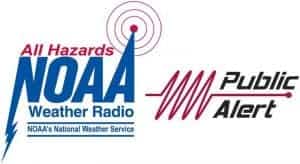
Many other disasters can occur during a heatwave. An NOAA emergency radio with the SAME alert feature can be programmed so an alarm goes off if any disaster occurs in your area. That way, you stay informed without having to listen to the radio constantly.
Read more about how to choose an NOAA radio here.
14. Have a Bug Out Bag Packed
If a wildfire or other major disaster occurs due to the heatwave, you must evacuate and FAST. Now is the time to build a Bug Out Bag so you are ready to leave if necessary. You’ll also want to ensure your evacuation vehicle is prepared and you have a plan for where to go.
How are you prepping for massive heatwaves? Let us know in the comments below.
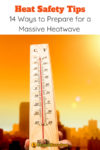


Great article
One thing that raises the heat index =
running a/c in the home, business and vehicles
Solar panels also emit a ton of heat
If possible, adding awnings over doors and windows to help block sun shining on the structure
We have also added picnic shelters and other shaded areas that don’t require watering around our desert homestead to help keep the soil temps lower and this helps the nights to be cooler
Our buildings are painted white to help reflect the heat away
The house is built with 8” cinder blocks and has additional 4” insulation inside… we can keep the house very cool by opening windows at night and closing it up in the morning…
For anybody planning to build a home- highly recommend cinder block construction with an extra deep basement – easier to keep warm in the winter and keep cool in the summer,
By reducing the need for a/c and heavy electrical dependence you will be lowering the heat load on the environment… and if there is a power outage- easier to manage as well
I’d like to add a few extra options for those who don’t live in a place that can be kept at a reasonable temperature, which is the case of quite a few rented apartments…
1) If you can, temporarily move to a cooler place: I take my van up to the mountains when it’s too hot where I live.
Sedentary people in cities can also seek at least a few hours of coolness in air-conditioned public spaces such as libraries, shopping malls, cafés…
2) A good (and cheap!) method for cooling down a house without using energy is wetting the floor and putting wet and white or very pale coloured sheets in front of the windows on the outside. The evaporation makes the temperature go down by a few degrees. (Wearing a wet t-shirt also works, although this may have unintended consequences, ha ha!)
3) Bioclimatic architecture also has a load of useful ideas. Here’s an easy one : permanently install horizontal louvers over your windows so you can still enjoy the daylight without most of the heat. In the winter, when the sun is lower in the sky, it can still heat up the room.
4) It’s also time we learned a bit from people who permanently live in hot climates, they often have centuries old techniques for surviving the heat: Low tech and/but extremely efficient.
Keep cool and carry on! 😉
Love this!
Thanks for sharing
Your statement “Note that whole-home solar systems are tied to the grid and won’t work when the power goes out.” is only partially correct and partially incorrect. Not all whole-home solar systems are tied to the grid. An off-grid system will work when there is a power outage. However, you may need to spray the panels to cool them down when it’s super hot
Good point. I’ll update the post. A lot more people are setting up their grid-tied solar systems so they can still work when the power goes off.